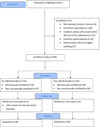Effectiveness and safety of the awakening and breathing coordination, delirium monitoring/management, and early exercise/mobility bundle
- PMID: 24394627
- PMCID: PMC4105208
- DOI: 10.1097/CCM.0000000000000129
Effectiveness and safety of the awakening and breathing coordination, delirium monitoring/management, and early exercise/mobility bundle
Abstract
Objective: The debilitating and persistent effects of ICU-acquired delirium and weakness warrant testing of prevention strategies. The purpose of this study was to evaluate the effectiveness and safety of implementing the Awakening and Breathing Coordination, Delirium monitoring/management, and Early exercise/mobility bundle into everyday practice.
Design: Eighteen-month, prospective, cohort, before-after study conducted between November 2010 and May 2012.
Setting: Five adult ICUs, one step-down unit, and one oncology/hematology special care unit located in a 624-bed tertiary medical center.
Patients: Two hundred ninety-six patients (146 prebundle and 150 postbundle implementation), who are 19 years old or older, managed by the institutions' medical or surgical critical care service.
Interventions: Awakening and Breathing Coordination, Delirium monitoring/management, and Early exercise/mobility bundle.
Measurements and main results: For mechanically ventilated patients (n = 187), we examined the association between bundle implementation and ventilator-free days. For all patients, we used regression models to quantify the relationship between Awakening and Breathing Coordination, Delirium monitoring/management, and Early exercise/mobility bundle implementation and the prevalence/duration of delirium and coma, early mobilization, mortality, time to discharge, and change in residence. Safety outcomes and bundle adherence were monitored. Patients in the postimplementation period spent three more days breathing without mechanical assistance than did those in the preimplementation period (median [interquartile range], 24 [7-26] vs 21 [0-25]; p = 0.04). After adjusting for age, sex, severity of illness, comorbidity, and mechanical ventilation status, patients managed with the Awakening and Breathing Coordination, Delirium monitoring/management, and Early exercise/mobility bundle experienced a near halving of the odds of delirium (odds ratio, 0.55; 95% CI, 0.33-0.93; p = 0.03) and increased odds of mobilizing out of bed at least once during an ICU stay (odds ratio, 2.11; 95% CI, 1.29-3.45; p = 0.003). No significant differences were noted in self-extubation or reintubation rates.
Conclusions: Critically ill patients managed with the Awakening and Breathing Coordination, Delirium monitoring/management, and Early exercise/mobility bundle spent three more days breathing without assistance, experienced less delirium, and were more likely to be mobilized during their ICU stay than patients treated with usual care.
Conflict of interest statement
The remaining authors have disclosed that they do not have any potential conflicts of interest.
Figures


Comment in
-
Everybody, every day: an "awakening and breathing coordination, delirium monitoring/management, and early exercise/mobility" culture is feasible in your ICU.Crit Care Med. 2014 May;42(5):1280-1. doi: 10.1097/CCM.0000000000000199. Crit Care Med. 2014. PMID: 24736334 No abstract available.
-
Evaluation of the effectiveness and safety of the awakening and breathing coordination, delirium monitoring/management, and early exercise/mobility bundle: several confounders to be considered.Crit Care Med. 2014 Oct;42(10):e680-1. doi: 10.1097/CCM.0000000000000492. Crit Care Med. 2014. PMID: 25226143 No abstract available.
-
The author replies.Crit Care Med. 2014 Oct;42(10):e681. doi: 10.1097/CCM.0000000000000571. Crit Care Med. 2014. PMID: 25226144 No abstract available.
References
-
- Ely EW, Shintani A, Truman B, et al. Delirium as a predictor of mortality in mechanically ventilated patients in the intensive care unit. JAMA. 2004;291(14):1753–1762. - PubMed
-
- Ely EW, Inouye SK, Bernard GR, et al. Delirium in mechanically ventilated patients: Validity and reliability of the confusion assessment method for the intensive care unit (CAM-ICU) JAMA. 2001;286(21):2703–2710. - PubMed
-
- Witt NJ, Zochodne DW, Bolton CF, et al. Peripheral nerve function in sepsis and multiple organ failure. Chest. 1991;99:176–184. - PubMed
-
- Berek K, Margreiter J, Willeit J, Berek A, Schmutzhard E, Mutz NJ. Polyneuropathies in critically ill patients: A prospective evaluation. Intensive Care Med. 1996;22:849–855. - PubMed
-
- De Jonghe B, Bastuji-Garin S, Sharshar T, Outin H, Brochard L. Does ICU-acquired paresis lengthen weaning from mechanical ventilation? Intensive Care Med. 2004;306:1117–1121. - PubMed
Publication types
MeSH terms
Substances
Grants and funding
LinkOut - more resources
Full Text Sources
Other Literature Sources
Medical

